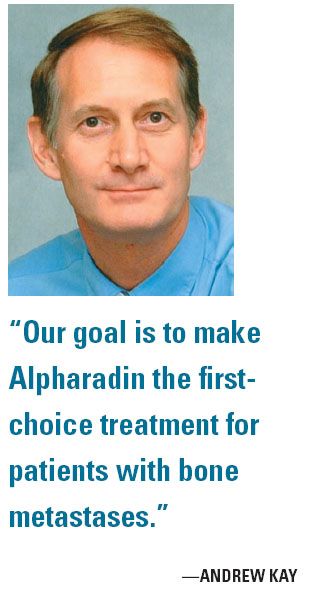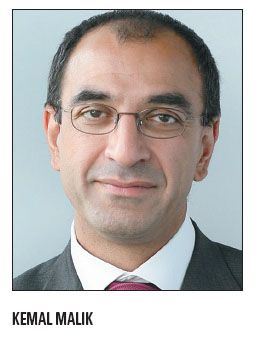New class of alpha emitters takes aim at bone metastases
A new class of cancer alpha-pharmaceuticals is approaching the marketplace, one built around the basis of radiotherapy itself. An isotope of radium, the element discovered more than a century ago by Pierre and Marie Curie, is the cornerstone of this new class of radiopharmaceuticals.
A new class of cancer alpha-pharmaceuticals is approaching the marketplace, one built around the basis of radiotherapy itself. An isotope of radium, the element discovered more than a century ago by Pierre and Marie Curie, is the cornerstone of this new class of radiopharmaceuticals.
Bayer Schering Pharma executives believe so strongly in the first such drug, Alpharadin (radium-223 chloride), that the German pharmaceutical company last month bought the marketing rights from its developer, Oslo, Norway-based Algeta for more than $60 million up front and payments for development, manufacturing, and commercialization milestones that could exceed $740 million.

A profit-sharing arrangement means the total paid for the rights to this drug could go even higher if Algeta helps promote its sale in the U.S. Algeta will also receive payments for manufacture and supply of the commercial product. Algeta negotiated all this and got Bayer Schering Pharma to shoulder most of the remaining costs needed to bring Alpharadin to market. Algeta is jockeying to make Alpharadin the first commercially available therapeutic to kill cancer with alpha radiation. This high-impact radiation travels only a short distance, limiting radiation exposure. A calcium-like component of Alpharadin drives the drug selectively to bone.
Early clinical trials have shown its promise as a treatment for life-threatening bone metastases found in patients with symptomatic hormone-refractory prostate cancer (HRPC). And Algeta has more such alpha-based drugs in its pipeline, experimental drugs being groomed to treat other cancers. “We retain a full pipeline that is not part of the Bayer deal,” said Algeta CEO Andrew Kay, who plans to use the funding from Bayer to turn Algeta into a pharmaceutical company specializing in oncology products. This company will have a formidable sales infrastructure in the U.S., one developed initially to copromote Alpharadin but capable of supporting the marketing and sale of future products as well, Mr. Kay said.
Alpharadin itself will likely reach well beyond its initial application in HRPC patients. The drug shows potential in treating bone metastases caused by other tumor types, such as breast, lung, kidney, and thyroid cancers. Its promise for prostate patients, however, was enough for Bayer to commit to the drug’s commercial development.
“We believe that Alpharadin has great potential in the therapy of life-threatening bone metastases,” said Kemal Malik, head of global development at Bayer Schering Pharma. “The data obtained so far show that this novel active substance may be able to increase overall survival considerably.”

Phase II results, reported at ECCO/ESMO 2009, indicate that Alpharadin increases overall patient survival, improves quality of life, and has a placebo-like safety profile. In one trial, median survival was more than 40% longer in the Alpharadin-treated group of 33 patients. In a second trial, a single dose of the drug alleviated pain for 100 patients. The most prominent effects were seen in those receiving the highest dose. In the third trial, the drug significantly reduced the level of prostate-specific antigen circulating in 122 patients. It was accompanied by rare and only modest adverse gastrointestinal and musculoskeletal side effects (abstracts O7003, P7011, and P7018).
Based on a price of $22,000 per patient treatment cycle, the drug could generate peak annual revenues of up to $1.9 billion, Mr. Kay said in an analyst briefing. Prostate cancer is the second most frequently diagnosed cancer in men and a leading cause of cancer-related death in men. In 2007, some 450,000 new cases of prostate cancer were diagnosed globally. Widespread use of Alpharadin, however, remains at least several years away.
Phase III testing in patients with HRPC and accompanying skeletal metastases is scheduled to continue through 2011. This randomized, double-blind, placebo-controlled study involving 750 patients, called the ALSYMPCA (Alpharadin in Symptomatic Prostate Cancer) trial, has overall survival as the primary endpoint to determine efficacy.
“Our goal is to make Alpharadin the first-choice treatment for patients with bone metastases-starting with prostate cancer and then moving to breast and potentially lung and kidney,” Mr. Kay said. “For all these patients with bone metastases, there is really very little effective therapy.”